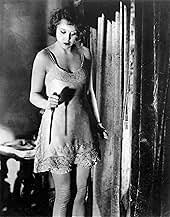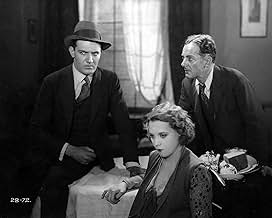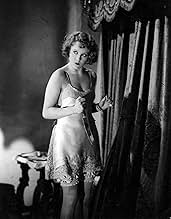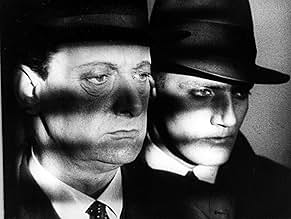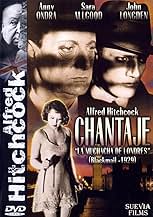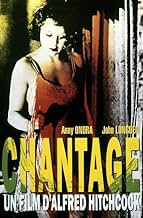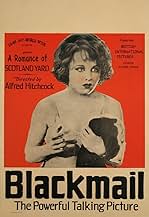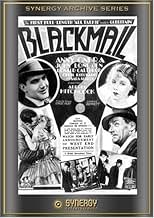VALUTAZIONE IMDb
6,9/10
13.001
LA TUA VALUTAZIONE
Dopo aver ucciso un uomo per proteggere sè stessa, una giovane donna viene ricattata da un testimone dell'omicidio.Dopo aver ucciso un uomo per proteggere sè stessa, una giovane donna viene ricattata da un testimone dell'omicidio.Dopo aver ucciso un uomo per proteggere sè stessa, una giovane donna viene ricattata da un testimone dell'omicidio.
- Regia
- Sceneggiatura
- Star
- Premi
- 2 vittorie totali
Ex-Det. Sergt. Bishop
- The Detective Sergeant
- (as Ex-Det. Sergt. Bishop - Late C.I.D. Scotland Yard)
Johnny Ashby
- Boy
- (non citato nei titoli originali)
Joan Barry
- Alice White
- (voce)
- (non citato nei titoli originali)
Johnny Butt
- Sergeant
- (non citato nei titoli originali)
Alfred Hitchcock
- Man on Subway
- (non citato nei titoli originali)
Phyllis Konstam
- Gossiping Neighbour
- (non citato nei titoli originali)
Sam Livesey
- The Chief Inspector (silent version)
- (non citato nei titoli originali)
Phyllis Monkman
- Gossip Woman
- (non citato nei titoli originali)
Percy Parsons
- Crook
- (non citato nei titoli originali)
Recensioni in evidenza
Alfred Hitchcock's first talkie is an intriguing film, not entirely successful but still more enjoyable than some of the other films Hitch made around this time. The story starts with a woman cheating on her boyfriend, a Scotland Yard detective. When the man she's with tries to rape her, she kills him in self-defense. Afterwards a criminal who pieces it together blackmails her and her detective boyfriend.
A little creaky but that's to be expected under the circumstances. The film started out being made as a silent before it was decided to turn it into a sound picture. In spots it reverts back to a silent (without intertitles). This actually works in the film's favor. There are some really nicely done lengthy sequences with no dialogue, such as her walk home after she's killed the guy, punctuated by a scream. Good acting all around. Nice direction from Hitch. The museum climax is excellent; an early example of the defining set pieces that would become a Hitchcock trademark. Definitely worth a look if you're a fan. Or even if you're not, provided you enjoy pictures from this period. Not everyone does, unfortunately.
A little creaky but that's to be expected under the circumstances. The film started out being made as a silent before it was decided to turn it into a sound picture. In spots it reverts back to a silent (without intertitles). This actually works in the film's favor. There are some really nicely done lengthy sequences with no dialogue, such as her walk home after she's killed the guy, punctuated by a scream. Good acting all around. Nice direction from Hitch. The museum climax is excellent; an early example of the defining set pieces that would become a Hitchcock trademark. Definitely worth a look if you're a fan. Or even if you're not, provided you enjoy pictures from this period. Not everyone does, unfortunately.
Britain's first talkie, the 1929 "Blackmail," is directed by Alfred Hitchock, and even back then, it has many of his touches. The stars are Anny Ondra, Cyril Ritchard, John Longden, and Sara Allgood.
A young woman (Ondra) two-times her Scotland Yard inspector boyfriend (Longden) and goes out with an artist (Ritchard). Things get rough in his apartment, and he forces himself on her.
She kills him (a la Dial M for Murder). Her boyfriend finds her glove in the apartment and realizes she did it; the other glove was found by a criminal hanging around the artist's apartment building, and he decides to blackmail the inspector.
Hitchcock more than appears in this film; he has a bit with a little boy on a subway. The film is strange in that the beginning is silent with no title cards. Then suddenly, there is sound.
It moves quite slowly, with not much in the way of action. The story builds slowly, and the scene in the artist's apartment is quite long before anything happens.
Nevertheless, the Hitchcock touches are there. A pivotal scene happens at the British Museum - Hitchcock's upheaval in familiar places. And in the jail scene, there's a sound the director often described as being terrifying in his childhood when his father had the local police teach him a lesson - the jail door closing.
The very pretty Ondra, wife of boxer Max Schmelling, is dubbed here. Ritchard in 1929 is not recognizable as Captain Hook.
Worth seeing - it's early Hitchcock and it's an 80-year-old movie. Mind-boggling.
A young woman (Ondra) two-times her Scotland Yard inspector boyfriend (Longden) and goes out with an artist (Ritchard). Things get rough in his apartment, and he forces himself on her.
She kills him (a la Dial M for Murder). Her boyfriend finds her glove in the apartment and realizes she did it; the other glove was found by a criminal hanging around the artist's apartment building, and he decides to blackmail the inspector.
Hitchcock more than appears in this film; he has a bit with a little boy on a subway. The film is strange in that the beginning is silent with no title cards. Then suddenly, there is sound.
It moves quite slowly, with not much in the way of action. The story builds slowly, and the scene in the artist's apartment is quite long before anything happens.
Nevertheless, the Hitchcock touches are there. A pivotal scene happens at the British Museum - Hitchcock's upheaval in familiar places. And in the jail scene, there's a sound the director often described as being terrifying in his childhood when his father had the local police teach him a lesson - the jail door closing.
The very pretty Ondra, wife of boxer Max Schmelling, is dubbed here. Ritchard in 1929 is not recognizable as Captain Hook.
Worth seeing - it's early Hitchcock and it's an 80-year-old movie. Mind-boggling.
While remembered as the first sound picture made by Alfred Hitchcock (or anyone else in Britain), there is much more to "Blackmail" than merely historical interest. It reveals the director's subtle creativity, with a carefully structured story that also produces some real suspense, with one of Hitchcock's best cameos and an entertaining chase sequence as bonuses. The movie has a unique feel, as Hitchcock was still using many silent film techniques at the same time that he was experimenting with sound. Not all of this works perfectly, but it does not detract from the film's many positive features.
Alice White (Anny Ondra, voice dubbed by Joan Barry) goes out for the evening with her boyfriend, who is a police detective (John Longden). When they have a series of minor quarrels, Alice decides to go her own way, and meets an artist friend. The artist's intentions are obvious, but Alice is innocently unaware. When he brings her to his studio, there is soon an unpleasant confrontation that sets in motion a turbulent series of events.
The story is carefully constructed not just to produce suspense but also to raise interesting questions in the viewer's mind. Alice feels a terrible sense of guilt and fear over what has happened - communicated to the viewer in a variety of creative ways - but of what is she really guilty? The behavior of the detective boyfriend is partly well-intentioned, but he certainly is not faultless. The moral ambiguity is often subtle, because it takes a back seat to the suspense, and it takes a couple of viewings to appreciate all that is going on.
There is a particularly nice symmetry to the beginning and ending, pointing to the greater significance of the action in between. The opening sequence (filmed in silent movie style) shows the detective and his partner dealing with a suspect in a routine way, not caring about him as a person. In the final scenes, when the detective must help Alice make a final report on everything that has happened, he sees his job in a far different perspective.
"Blackmail" is of the darker type of Hitchcock, like "Notorious" or "Vertigo". While clearly made in a different era, it has the same kind of depth and craftsmanship that distinguished those later, more well-known masterpieces.
Alice White (Anny Ondra, voice dubbed by Joan Barry) goes out for the evening with her boyfriend, who is a police detective (John Longden). When they have a series of minor quarrels, Alice decides to go her own way, and meets an artist friend. The artist's intentions are obvious, but Alice is innocently unaware. When he brings her to his studio, there is soon an unpleasant confrontation that sets in motion a turbulent series of events.
The story is carefully constructed not just to produce suspense but also to raise interesting questions in the viewer's mind. Alice feels a terrible sense of guilt and fear over what has happened - communicated to the viewer in a variety of creative ways - but of what is she really guilty? The behavior of the detective boyfriend is partly well-intentioned, but he certainly is not faultless. The moral ambiguity is often subtle, because it takes a back seat to the suspense, and it takes a couple of viewings to appreciate all that is going on.
There is a particularly nice symmetry to the beginning and ending, pointing to the greater significance of the action in between. The opening sequence (filmed in silent movie style) shows the detective and his partner dealing with a suspect in a routine way, not caring about him as a person. In the final scenes, when the detective must help Alice make a final report on everything that has happened, he sees his job in a far different perspective.
"Blackmail" is of the darker type of Hitchcock, like "Notorious" or "Vertigo". While clearly made in a different era, it has the same kind of depth and craftsmanship that distinguished those later, more well-known masterpieces.
Hitchcock's Blackmail might have been a total train wreck in the hands of a lesser talent. Instead, it is a remarkable piece of cinematic history, and still tremendously entertaining after 78 years. The film was partly shot when Hitchcock learned that he would have access to sound equipment. His female lead was a talented German silent picture actress, whose accent was too heavy for sound, so an off-camera reader had to be used, plus a decent amount of expensive film had already been used and had to be integrated into the 'talkie' as well.
All considered, the movie is probably the best example of the transition from these two cinematic paradigms that can be found.
The silent portion of the film establishes John Longden's character as a hard-nosed young Scotland Yard detective. Anny Ondra plays the lovely young lady who is engaged to him,and who soon becomes the center of our attention. One night after they argue over some petty matters, they part company and Anny meets up with a male artist friend, who, unbeknownst to her, is interested in more than just pleasant conversation. Frank (Longden) spots them leaving the restaurant and follows them for a while. The artist coaxes Alice (Ondra) up to his flat, and things take a sinister turn in short order.
Over the second half of the film, the plots unfolds, and the emotions and consciences of the protagonists are sorely tried.
What immediately blew my mind was what a great silent director Hitchcock was. Shouldn't have been too surprising since Hitchcock has always struck me as a master cinematographer. The first 20 minutes of the film are completely silent,and there are no interruptions from distracting story boards. Nevertheless, through incredible use of lighting, camera work, and evocative acting, you understand everything that is going on clearly, and are drawn straight into the edgy atmosphere so familiar to those who appreciate the work of this great director.
The acting is mostly very good. Only Longden sometimes seems to over or under-act his part, and Ondra is really wonderful all the way through. I was not surprised to learn of her lengthy and productive career both before and after this film and will now look for more of her work.It is also interesting to see how the actors adapted so readily to the new medium. Although some have said that the sound portion of this film seemed over-acted because the actors were still clinging to silent film conventions, I really can not agree. Some of the characters (Alice, for example) required very evocative, rather physical performances, and I can't imagine how she could have done better.
Highly recommended for the amazing photography, exceptionally professional though very early use of sound, and the typically perfect pace.
All considered, the movie is probably the best example of the transition from these two cinematic paradigms that can be found.
The silent portion of the film establishes John Longden's character as a hard-nosed young Scotland Yard detective. Anny Ondra plays the lovely young lady who is engaged to him,and who soon becomes the center of our attention. One night after they argue over some petty matters, they part company and Anny meets up with a male artist friend, who, unbeknownst to her, is interested in more than just pleasant conversation. Frank (Longden) spots them leaving the restaurant and follows them for a while. The artist coaxes Alice (Ondra) up to his flat, and things take a sinister turn in short order.
Over the second half of the film, the plots unfolds, and the emotions and consciences of the protagonists are sorely tried.
What immediately blew my mind was what a great silent director Hitchcock was. Shouldn't have been too surprising since Hitchcock has always struck me as a master cinematographer. The first 20 minutes of the film are completely silent,and there are no interruptions from distracting story boards. Nevertheless, through incredible use of lighting, camera work, and evocative acting, you understand everything that is going on clearly, and are drawn straight into the edgy atmosphere so familiar to those who appreciate the work of this great director.
The acting is mostly very good. Only Longden sometimes seems to over or under-act his part, and Ondra is really wonderful all the way through. I was not surprised to learn of her lengthy and productive career both before and after this film and will now look for more of her work.It is also interesting to see how the actors adapted so readily to the new medium. Although some have said that the sound portion of this film seemed over-acted because the actors were still clinging to silent film conventions, I really can not agree. Some of the characters (Alice, for example) required very evocative, rather physical performances, and I can't imagine how she could have done better.
Highly recommended for the amazing photography, exceptionally professional though very early use of sound, and the typically perfect pace.
A nice thriller with typical Hitch themes that remains famous thanks to a messy , complex story of attempted rape , killing in self-defense , blackmail , pursuit to death and look for Alfred's screen cameo . It is set in London , later a bitter discussion among lovers , the beautiful vendor Alice White (Amy Ondra , voice by Joan Barry) , sneaks away from her boyfriend and good-looking, efficient and impersonal Scotland Yard police , Frank Webber (John Longden) , to go out on an ill-advised date with the sleazy artist , Mr Crewe (Cyril Ritchard) . However, as the naive girl is lured into Crewe's studio, his sinister sexual advances will soon arm Alice's hand with a serrated bread knife, and before she knows it, the man lies dead in a pool of blood. As the saleswoman Alice getaways the scene of the crime in a numb haze , while the news of the unknown killer is spreading like wildfire all the way up to fiancé Frank's ears . Then Frank elides into a messy , personal story full of turns and while he attempts to keep his girlfriend from being involved .
An early talkie with script by Charles Bennett and Hitchcock himself , as usual , including a lot of sequences that remain genuinely amazing and striking . The dark atmosphere reeks with the feeling something nasty is going to happen any second . Britain's first period directed by Hitchcock who makes his ordinary small appearance on a tube train . It follows the police investigation of a murder with several twists and turns , while an invisible eyewitness will become a ruthless blackmailer . One of the first and best Alfred film to explore the ideas and themes that would become his trademarks , including climatic and memorable scenes . Future successful filmmakers Michael Powell and Ronald Neame were stills cameraman and clapper boy respectively .
The motion picture was well realized by Alfred Hitchcock , his first sound film for Great Britain . Being made as a silent movie , this was an early talkie , and still stunningly hypnotic to see today . In fact , being , nowadays ,more stimulating for its innovations in that area , and by experimenting with a peculiar narrative structure . This fine early effort by Hitch has several novelties , as the movie transcends the limitation of its mystery plot by dealing with thought-provoking issues and focusing on the theatrical meditations of reality . Here Alfred gives signs to be an expertise at tightening tension was already building up . The film belongs to Hitch's first British period when he directed silent films such as ¨The lodger¨ (1926) , ¨The ring¨(1927) , ¨Easy virtue¨ (1927) , ¨The Manxman¨(29) ; being ¨Blackmail¨(29) made as a silent , this was reworked to become a talkie . Following sound movies and early talkies as ¨Murder¨(1930 , ¨June and the Paycock¨(30) , ¨Skin Game¨(31) , ¨Rich and strange¨(32) , ¨Number 17¨(32) , ¨The man who knew too much¨(34) , ¨The 39 steps¨ (35) , ¨The secret agent¨(36) , ¨Sabotage¨(36) , ¨The lady vanishes¨(38) , ¨Jamaica Inn¨ (39) until he is hired by David O'Selznick to shoot¨Rebecca¨(40) in the US .
An early talkie with script by Charles Bennett and Hitchcock himself , as usual , including a lot of sequences that remain genuinely amazing and striking . The dark atmosphere reeks with the feeling something nasty is going to happen any second . Britain's first period directed by Hitchcock who makes his ordinary small appearance on a tube train . It follows the police investigation of a murder with several twists and turns , while an invisible eyewitness will become a ruthless blackmailer . One of the first and best Alfred film to explore the ideas and themes that would become his trademarks , including climatic and memorable scenes . Future successful filmmakers Michael Powell and Ronald Neame were stills cameraman and clapper boy respectively .
The motion picture was well realized by Alfred Hitchcock , his first sound film for Great Britain . Being made as a silent movie , this was an early talkie , and still stunningly hypnotic to see today . In fact , being , nowadays ,more stimulating for its innovations in that area , and by experimenting with a peculiar narrative structure . This fine early effort by Hitch has several novelties , as the movie transcends the limitation of its mystery plot by dealing with thought-provoking issues and focusing on the theatrical meditations of reality . Here Alfred gives signs to be an expertise at tightening tension was already building up . The film belongs to Hitch's first British period when he directed silent films such as ¨The lodger¨ (1926) , ¨The ring¨(1927) , ¨Easy virtue¨ (1927) , ¨The Manxman¨(29) ; being ¨Blackmail¨(29) made as a silent , this was reworked to become a talkie . Following sound movies and early talkies as ¨Murder¨(1930 , ¨June and the Paycock¨(30) , ¨Skin Game¨(31) , ¨Rich and strange¨(32) , ¨Number 17¨(32) , ¨The man who knew too much¨(34) , ¨The 39 steps¨ (35) , ¨The secret agent¨(36) , ¨Sabotage¨(36) , ¨The lady vanishes¨(38) , ¨Jamaica Inn¨ (39) until he is hired by David O'Selznick to shoot¨Rebecca¨(40) in the US .
Lo sapevi?
- QuizMuch of the filming originally was shot silently. When sound became available during the course of shooting, Sir Alfred Hitchcock reshot certain scenes with sound, thus making it his first talkie. There was one complication with this change, however. Leading lady Anny Ondra had a thick Czech accent which was inappropriate for her character, Alice White. Joan Barry was chosen to provide a different voice for her, but post-production dubbing technology did not exist then. The solution was for Barry to stand just out of shot and read Alice's lines into a microphone as Ondra mouthed them in front of the camera. [This is a major plot point of Cantando sotto la pioggia (1952), which is set in the era of movie studios moving from silent pictures to talkies.] This generally is acknowledged as the first instance of one actress' voice being dubbed by another, even though the word "dub" is technologically inappropriate in this case.
- BlooperAt about 0:24:30 when Crewe (Cyril Ritchard) is talking to Alice (Anny Ondra), he calls her "Anny" before correcting himself.
- Citazioni
Alice White: You and your Scotland Yard! If it weren't for Edgar Wallace, no one would ever have heard of it.
- Versioni alternativeOriginally filmed as a silent movie, running 75 minutes; Hitchcock later added newly shot scenes and had other existing footage dubbed to create a talkie version, running 86 minutes.
- ConnessioniEdited into Der Zinker (1931)
- Colonne sonoreMiss Up-to-Date
(1929) (uncredited)
Words by Frank Eyton and music by Billy Mayerl
Performed by Cyril Ritchard
I più visti
Accedi per valutare e creare un elenco di titoli salvati per ottenere consigli personalizzati
- How long is Blackmail?Powered by Alexa
- Are the first eight minutes supposed to be silent?
- Why are the picture and sound so bad?
- Is this film really in the U.S. public domain?
Dettagli
- Data di uscita
- Paese di origine
- Lingua
- Celebre anche come
- Blackmail
- Luoghi delle riprese
- Azienda produttrice
- Vedi altri crediti dell’azienda su IMDbPro
Botteghino
- Lordo in tutto il mondo
- 160 USD
- Tempo di esecuzione1 ora 25 minuti
- Colore
- Proporzioni
- 1.20 : 1
Contribuisci a questa pagina
Suggerisci una modifica o aggiungi i contenuti mancanti


